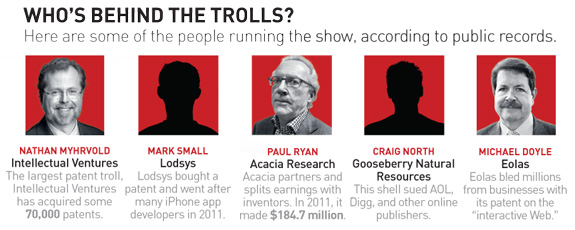
Thomas Edison invented the light bulb and got filthy rich off of it. Ok, that’s not exactly true; he simply based his light bulb on existing research: twenty three different light bulbs were developed before Edison’s… and all that about 99% perspiration and 1% inspiration? Well, that’s because he had practically nothing to do with the “inspiration” part. As for the “perspiration”, he had dozens of hired “muckers” perform exhaustive testing on a variety of materials, until he found the best one for the existing blueprints for the light bulb. Then he patented it. Hey, he never claimed to be the one who did any of the perspiring did he?
Alas, it seems that some “enterprising” individuals have one-upped ye olde inspiration/perspiration robber: meet the Patent Troll, a person who creates patents based on extremely vague concepts that he never intends to actually be able to create himself. At least Edison had to hire people to test (and risk grievous injury while testing) his light bulbs…
For example,you could patent a floating thing that can shoot lasers… Or better yet, a floating thing that shoots things. And when somebody ACTUALLY invents that floating banana that shoots popcorn kernels, you sue him! And guess what, you might win if he’s got no money to fight you in court!
This sort of activity threatens to undermind pretty much all forms of creative thought, as these educated individuals will tell you:
“Why, precisely when the market for their product had just taken off, would companies stop innovating? An explanation comes from Catherine Tucker, an economist at MIT who has studied the medical IT sector. In an unpublished study, she shows that the slowdown in R&D occurred as a result of litigation by a company whose primary reason for existing is to acquire the rights to others’ inventions and file patent claims against producers of related products — a patent troll. Tucker’s study is, to date, one of the best pieces of quantitative evidence of the broken state of America’s patent system, a critical concern not just for improving health care but for encouraging the innovation that’s needed to ensure future economic prosperity.” — Ray Fisman, Slate, April 9, 2012
“Researchers from Harvard and the University of Texas recently examined R&D spending of publicly listed firms that had been sued by patent trolls. They compared firms where the suit was dismissed, representing a clear win for the defendant, to those where the suit was settled or went to final adjudication (typically much more costly). As in the previous paper, this comparison helped them isolate the effect of lawsuits from other factors. They found that when lawsuits were not dismissed, firms reduced their R&D spending by $211 million and reduced their patenting significantly in subsequent years. The reduction in R&D spending represents a 48% decline.” — James Bessen, Harvard Business Review, Nov. 2014
It seems that both the Republicans and the Democrats have decided to back a bill that would restrict this form of lazy profiteering…. I tend to think that this is because in this case, it’s their extremely wealthy corporate backers who have lost money to these trolls. After all, not too many individuals have the kind of money necessary to create a floating banana that shoots popcorn kernels… Maybe I should patent that.
sources: Upworthy
This Article (How To Make Money Off Of Other People’s Inventions) is free and open source. You have permission to republish this article under a Creative Commons license with attribution to the author and AnonHQ.com





WOW!